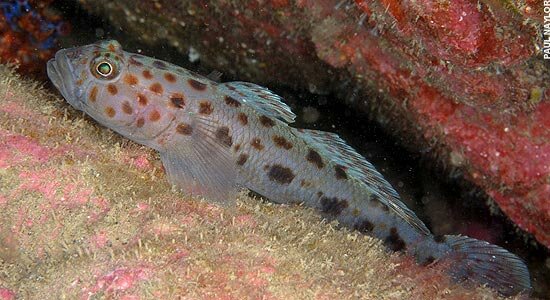Environmental protection groups have launched an 11th hour bid to get better legal protection for marine life around Britain’s shores.
They will be protesting in Westminster today as the new Marine and Coastal Access Bill completes its passage through Parliament.

Leopard spot goby in waters off the British coast
The groups say it will be the last chance to insert tougher measures into the Bill which will guarantee protection for the most important areas in the marine environment.
The RSPB, The Wildlife Trusts, the Marine Conservation Society and WWF have been campaigning for comprehensive legislation for almost a decade.
They claim the current proposals are too weak and won’t prevent the steady decline of many marine species and habitats in UK waters due to over fishing and industrialisation.
The UK’s coastline is home to a wide variety of species, including: 18 exclusively marine species of seabird, such as puffin, gannet, kittiwake and guillemot; the world’s second largest fish – the basking shark; more than half of the world’s grey seals; two dozen species of whale and dolphin, innumerable corals and two types of seahorse.
The groups want to see three key changes to the legislation:
- The inclusion of a clear duty to designate Marine Conservation Zones (MCZs) for the protection of the full range of marine wildlife or habitats.
- Amendment of the Bill to ensure that individual MCZs contribute to an ecologically coherent network of marine protected areas, which must also include some ‘highly protected’ sites.
- The removal of the clause that states socio-economic factors (such as fishing) can be taken into account when deciding whether or not to designate an MCZ.
They allege the poor drafting of the 1981 Wildlife & Countryside Act led to only three marine sites ever being designated in almost 30 years.
Melissa Moore, senior policy officer with the Marine Conservation Society, said: “MPs and Peers have a unique opportunity right now to strengthen the Marine and Coastal Access Bill. Let’s hope they have got the guts to deliver the protection the British public want.”
And Martin Harper, head of sustainable development for the RSPB, said: “Given that the seas around our islands have shaped our history and geography, the UK has a lackluster record on the protection of our marine natural heritage.
“Our seas contain some of the most impressive wildlife on earth, including ancient cold-water coral reefs, the world’s second largest fish and some of the world’s largest seabird populations. But none of these treasures has the complete protection they deserve.
“Considering this immense natural wealth, it is staggering to think that the UK only has paltry set of three marine nature reserves.”
The Marine and Coastal Access Bill is currently in the House of Lords and it will commence its passage through the House of Commons within weeks.
Joan Edwards, head of marine policy for The Wildlife Trusts, commented: “The Wildlife Trusts have campaigned for more than a decade for new laws to protect the UK’s amazing marine life. At long last, the Marine and Coastal Access Bill is passing through Parliament - but the Bill needs to be much stronger if it is really going to make a difference for our seas and sea life.
“It is literally ‘make or break’ time. With this Bill we have a ‘once in a lifetime’ opportunity. If our campaign succeeds, we will get the Bill we so urgently need and our seas will be protected and start to recover their health.
“If we fail, the state of our seas will continue on its downward spiral. We need to ensure that the Bill delivers effective protection for the marine environment.”
Natasha Barker, WWF UK’s senior marine policy officer, said: “The government says it has a vision of ‘clean, healthy, safe, productive and biologically diverse seas and oceans’.
“Unfortunately, the new Marine and Coastal Access Bill doesn’t go far enough towards guaranteeing this future for our seas. Today people from around the UK will demand better protection for our marine species and habitats. It’s vital MPs listen to their calls and ensure that the new marine legislation is strengthened.”
![]()



The environmental groups may find it dificcult to ensure enforcement of MCZ’s. Look at the EMS (European Marine Site) that runs from St Abbs in Berwick to Alnmouth in Northumberland, which is supposed to ensure that this eco system is protected from any damaging activities, yet trawling and dredging is a regular occurence in this area, with no intervention from the SFC’s